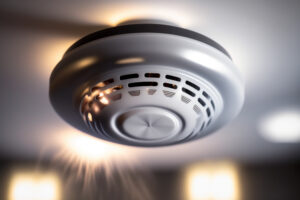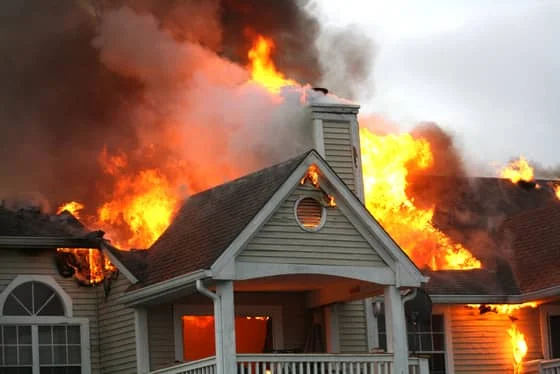Studies show that more than half of all fatal home fires start in a specific room of the house. Understanding in what room of the house most fatal fires start highlights the fragility of our living environments and underscores the crucial need to be aware of the specific threats that could risk the safety of our loved ones, potentially helping to avoid disastrous situations that may lead to selling a fire-damaged house.
A thorough understanding of the rooms within households where severe fires typically begin, along with the reasons they arise, is critical knowledge that could ultimately save lives. In the forthcoming sections, we will examine statistical data, explore the root causes, and provide effective recommendations to enhance your home’s protection against fire threats.
Fatal Fires by the Numbers
General Statistics About House Fires and Fatalities
 The occurrence of house fires is distressingly prevalent. Understanding in what room of the house most fatal fires start is crucial. As indicated by the U.S. Fire Administration (USFA), fire departments respond to an estimated 346,800 residential fires each year. Sadly, these fires result in over 2,600 deaths and inflict approximately $7.3 billion in property losses annually.
The occurrence of house fires is distressingly prevalent. Understanding in what room of the house most fatal fires start is crucial. As indicated by the U.S. Fire Administration (USFA), fire departments respond to an estimated 346,800 residential fires each year. Sadly, these fires result in over 2,600 deaths and inflict approximately $7.3 billion in property losses annually.
One in four residential fire deaths occurs when no smoke alarm is present, and insufficient fire prevention practices play a major role in increasing these tragic numbers. But where are these dangers most concentrated?
The Most Dangerous Room for Fatal Fires
Based on statistical data, it is observed that the bedroom is the predominant site for fatal fires, contributing extensively to fire-related casualties. This outcome may be surprising to many, as there is a common belief that the kitchen, despite being a frequent source of fires, represents the greatest danger.
A comparison of the bedroom with other areas such as the kitchen or living room reveals a significantly higher risk associated with the bedroom. Although fires in kitchens, primarily caused by cooking activities, are frequent, most of these incidents are contained without resulting in injuries. In contrast, fires that originate in bedrooms typically occur during nighttime hours when individuals are asleep, thereby reducing the available time for escape.
Why Do Fatal Fires Start in This Room?
Common Causes of Fires in the Bedroom
Several factors make the bedroom particularly prone to fatal fires. These include:
- Overloaded electrical outlets from devices like chargers or space heaters.
- Smoking near flammable materials, such as bedding or curtains.
- Candles left unattended—a small flame can easily ignite flammable materials without warning.
The Role of Time of Day
Bedroom fires commonly occur at night or in the early morning when residents are particularly susceptible. The inability to recognize danger while asleep, along with prolonged response times, significantly raises the chances of fatal incidents.
Human Behavior and Negligence
Habits such as forgetting to switch off heaters, incorrectly managing flammable substances, or not updating expired batteries in smoke detectors significantly increase the likelihood of bedroom fires. Tackling these behaviors is crucial for decreasing potential fatalities.
Prevention Strategies for Fatal Fires
Room-Specific Fire Prevention Tips
Bedroom:
- Avoid connecting several devices to a single power strip.
- Never smoke in bed or near flammable materials.
- Blow out candles before leaving the room or going to sleep.
- Consider installing a heat-resistant mattress and flame-retardant bedding.
Kitchen:
- Always remain present while cooking to ensure safety.
- Keep a fire extinguisher nearby and know how to use it.
- Store flammable materials, like cloth napkins, away from stovetops.
Living Room:
- Keep space heaters away from furniture and curtains.
- Inspect electrical cords for fraying and replace them as needed.
Importance of Working Smoke Alarms

Smoke detectors diminish the likelihood of fatality in domestic fires by 55%. It is essential to install them in every bedroom, corridor, and shared space. Conduct monthly tests, replace batteries once a year, and upgrade the devices every decade.
Other Safety Measures
To safeguard your home further:
- Use fire-resistant materials for furniture and curtains.
- Implement consistent home assessments to recognize any aging or faulty wiring along with other possible dangers.
- Create a detailed family fire escape plan and practice it regularly.
How to Protect Your Entire Home
Assessing Risk in Every Room
Perform a fire safety audit in your home. Check for:
- Overloaded electrical outlets in bedrooms, living rooms, and kitchens.
- Flammable items stored too close to heat sources.
- Expired or missing fire extinguishers.
Educating All Household Members
Provide training for everyone in your home, including children, on the proper responses to a fire. Basic safety tips such as “stop, drop, and roll” and recognizing two exit routes from each room are essential measures that can help preserve lives.
Actionable Takeaways
To reduce fire risks and protect your family, implement these steps today:
- Install and maintain smoke alarms in every sleeping area.
- Avoid using extension cords for heaters or large appliances.
- Keep fire extinguishers accessible and regularly inspected.
- Draft and practice an escape plan with your household.
Here’s a simple checklist to get started in your bedroom specifically:
- Test your smoke alarm.
- Blow out candles before leaving the room.
- Avoid smoking in bed or near flammable materials.
- Check all outlets for unsafe overloading.
Take Control of Fire Safety in Your Home
According to statistics, the bedroom is the most dangerous room in the context of fatal house fires, which underscores the importance of knowing in what room of the house most fatal fires start. However, the reassuring fact is that these risks can be addressed. With heightened awareness and the implementation of proper safety measures, it is feasible to prevent severe incidents.
The safety of your family begins with simple actions. Dedicate some time today to evaluate your home for potential fire hazards, inform your family members, and confirm that you possess essential safety equipment such as smoke detectors and fire extinguishers.
Empower yourself to safeguard your home and loved ones—because prevention today can protect your tomorrows.

